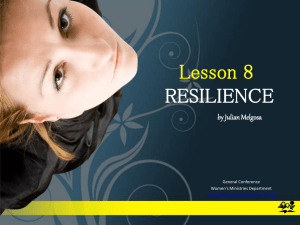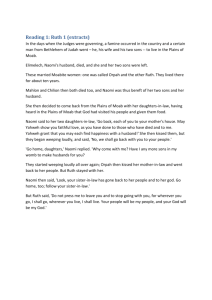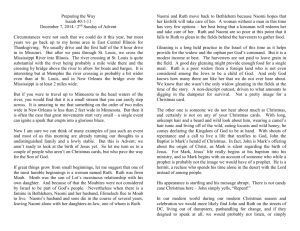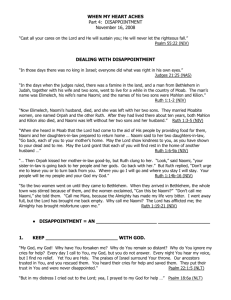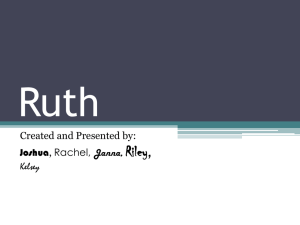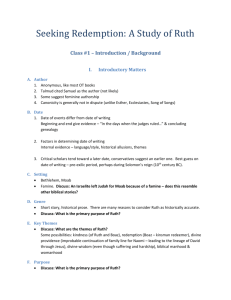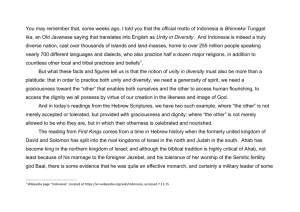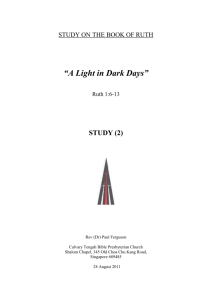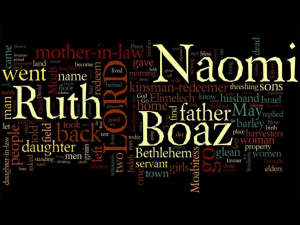File - Stoke Poges Free Church
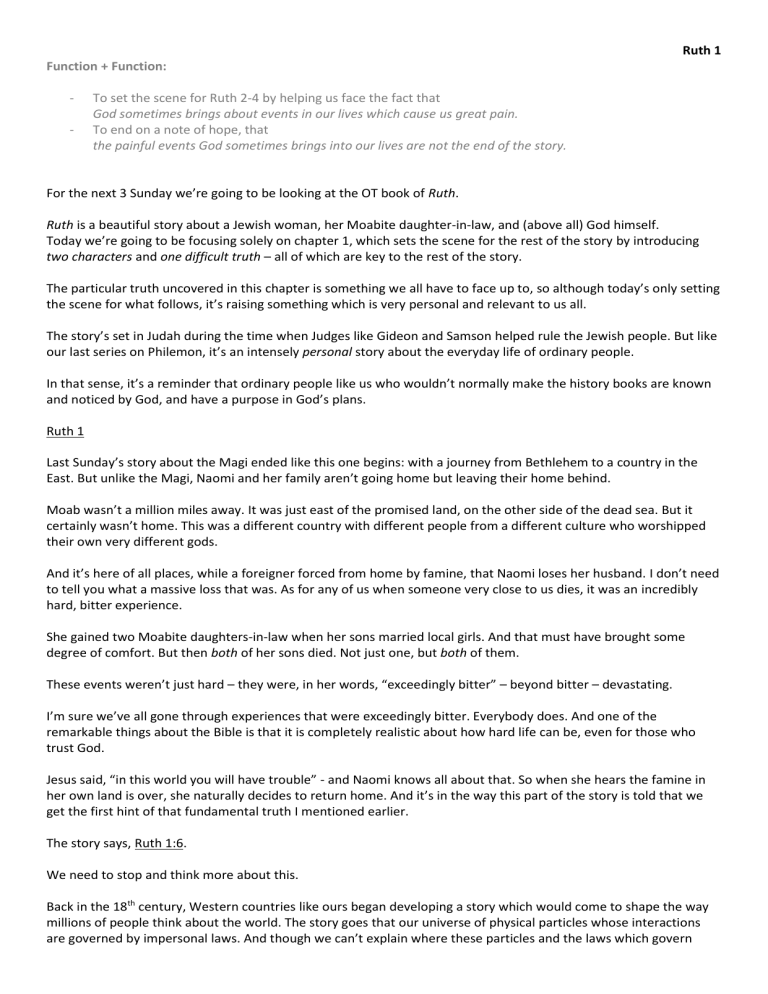
Ruth 1
Function + Function:
To set the scene for Ruth 2-4 by helping us face the fact that
God sometimes brings about events in our lives which cause us great pain.
To end on a note of hope, that the painful events God sometimes brings into our lives are not the end of the story.
For the next 3 Sunday we’re going to be looking at the OT book of Ruth.
Ruth is a beautiful story about a Jewish woman, her Moabite daughter-in-law, and (above all) God himself.
Today we’re going to be focusing solely on chapter 1, which sets the scene for the rest of the story by introducing
two characters and one difficult truth – all of which are key to the rest of the story.
The particular truth uncovered in this chapter is something we all have to face up to, so although today’s only setting the scene for what follows, it’s raising something which is very personal and relevant to us all.
The story’s set in Judah during the time when Judges like Gideon and Samson helped rule the Jewish people. But like our last series on Philemon, it’s an intensely personal story about the everyday life of ordinary people.
In that sense, it’s a reminder that ordinary people like us who wouldn’t normally make the history books are known and noticed by God, and have a purpose in God’s plans.
Ruth 1
Last Sunday’s story about the Magi ended like this one begins: with a journey from Bethlehem to a country in the
East. But unlike the Magi, Naomi and her family aren’t going home but leaving their home behind.
Moab wasn’t a million miles away. It was just east of the promised land, on the other side of the dead sea. But it certainly wasn’t home. This was a different country with different people from a different culture who worshipped their own very different gods.
And it’s here of all places, while a foreigner forced from home by famine, that Naomi loses her husband. I don’t need to tell you what a massive loss that was. As for any of us when someone very close to us dies, it was an incredibly hard, bitter experience.
She gained two Moabite daughters-in-law when her sons married local girls. And that must have brought some degree of comfort. But then both of her sons died. Not just one, but both of them.
These events weren’t just hard – they were, in her words, “exceedingly bitter” – beyond bitter – devastating.
I’m sure we’ve all gone through experiences that were exceedingly bitter. Everybody does. And one of the remarkable things about the Bible is that it is completely realistic about how hard life can be, even for those who trust God.
Jesus said, “in this world you will have trouble” - and Naomi knows all about that. So when she hears the famine in her own land is over, she naturally decides to return home. And it’s in the way this part of the story is told that we get the first hint of that fundamental truth I mentioned earlier.
The story says, Ruth 1:6.
We need to stop and think more about this.
Back in the 18 th century, Western countries like ours began developing a story which would come to shape the way millions of people think about the world. The story goes that our universe of physical particles whose interactions are governed by impersonal laws. And though we can’t explain where these particles and the laws which govern
them come from, that’s effectively all there is. According to this story, everything around us from the weather outside to the way we feel inside can ultimately be explained in terms of physical particles interacting according to impersonal laws.
That story has probably shaped the way we think more than we realise, because it’s a story that’s being told in the world around us all the time.
For example, take weather-programmes. Weather programmes present the movements and changes of the weather as something which is dictated solely by impersonal laws. If we get rain in the UK, it’s because of something like the jet stream. And the jet stream is just a giant flow of air which, according to the BBC website, is the result of a
constant play of forces across the planet as energy passes from the warmer tropics to the cooler polar regions. If we ask what controls the direction of the jet stream, the answer is that its basic direction is governed by the spin of the
Earth. That’s it. Things like whether it rains are dictated by impersonal forces. End of story.
But there’s another story which has shaped the lives of millions of people. According to this story, all the physical matter in the universe is the creation of a personal, intelligent, God. And the consistent orderly patterns we see in nature reflect the fact that this unchanging God directs his creation in consistent, purposeful ways.
These two stories completely alter the way we see the world.
According to the first story, everything that happens around us can ultimately be explained in terms of impersonal, purposeless forces. According to the second story, everything that happens around us can ultimately be explained in terms of a personal, purposeful God.
According to this story, things like the spin of the earth and the direction of the jet stream and whether it rains so we can eat are all ultimately in God’s hand. And that’s what the writer of Ruth says. Whatever other factors were involved, the famine in Judah and Israel ultimately came to an end because ‘the L ORD ...visited his people and [gave] them food’ (v.6).
Conversely, it follows logically that - whatever other factors were involved - the famine ultimately began because
God chose not to visit his people and give them food.
So we’re led to the conclusion that, ultimately, God is in control of everything that happens to us – both the good and the bad. And that’s something Naomi understands very well.
Look at v.13. Naomi’s trying to persuade her daughters-in-law to stay in Moab, where their chances of marrying and having a happy life seem greater. And in that conversation she attributes her ‘exceedingly bitter’ circumstances to
‘the hand of the L ORD .’
Then notice how Naomi describes her experiences to the women of Bethlehem when she returns: Ruth 1:20b-21.
She doesn’t ultimately attribute the death of her family to something impersonal, like disease, as if God is powerless to prevent it. She recognises the hand of God, not just once, but four times. She understands that God is in control of everything that happens in our lives – both the good and the bad.
Job knew that too. When God allowed Satan to harm Job, and Job’s property and children were subsequently destroyed by fire and wind and violent men, he didn’t ultimately attribute what happened to men or fire or wind or
Satan – as if God was unable to stop these things. He... Job 1:21.
Jeremiah saw things just the same. When King Nebuchadnezzar destroyed Jerusalem and took God’s people into exile in Babylon, Jeremiah didn’t ultimately attribute this bitter turn of events to the orders of Nebuchadnezzar. He said, Lamentations 3:37-38.
Hannah understood that too. When she eventually fell pregnant after years of childlessness, she recognised God’s hand in both the good and the bad: 1 Samuel 2:6-8.
In other words, God is in control.
The Lord Jesus understood and taught this too. He taught his disciples that not a single sparrow falls to the ground apart from the Father. And when the bitter events leading up to the cross began to unfold he continued to affirm that God was in control. When Pilate said, “Do you not know that I have authority to release you and authority to crucify you?” Jesus answered him, “You would have no authority over me at all unless it had been given you from above” (John 19:10-11).
Like Naomi and Job and Jeremiah and Hannah, our Lord Jesus knew that God was in control.
Bringing this into the present, the american Pastor, John Piper, tells the true story of a bus travelling to Bethlehem was hit by a swerving van carrying lumber in 1974. A piece of wood from the van came through the window of the bus and instantly killed his mum, who was on board. It was an incredibly painful experience for him and his family. It obviously left them with many unanswered questions. But he says this, “I took no comfort from the prospect that
God could not control the flight of a four-by-four.”
As hard as it is, that God is in control of creation is tremendously reassuring. Because if God is powerless to prevent bad things, he’s powerless to save us from them. All our hope rests on the fact that God is in ultimate control and able to work out his purposes.
Of course, that doesn’t help us make sense of the truth so powerfully put across in Naomi’s story. It doesn’t explain why, in god’s sovereignty, that piece of lumber fell from the roof of the van. It doesn’t explain why, in God’s sovereignty, Naomi lost a husband and two sons. It doesn’t explain why, in God’s sovereignty, Pilate was given authority over the fate of Jesus. We are still left with this difficult truth that our sovereign God sometimes brings about events in our lives which cause us great pain.
And that can be hard to deal with. In really hard times, we can find our perspective entirely swallowed up by the events that have caused us pain. That’s certainly what seems to have happened to Naomi. Despite the incredible dedication and devotion of her daughter-in-law, she feels she has nothing, v.21a.
For her, this is the end of the story. Naomi, which meant pleasant, has become Mara, which means bitter.
If we can relate to that sense of despair, it’s important that we realise this is quite literally not the end the story – any more than Jesus’ death was. This is only chapter one. And it ends on a note of hope: v.22.
When Naomi returns to Bethlehem, it’s life she sees: farmers in the fields, harvesting grain for the first time in years, singing while they work. The smell of the barley in the air was a reminder that, after many years of empty fields and lifeless crops, there’s life again in the field of Judah. Because ‘the Lord had visited his people and given them food’.
The Lord had not forsaken his people. The Lord had not forsaken her. And if we’ve put our faith in Christ, we can be sure he has not forsaken us.
